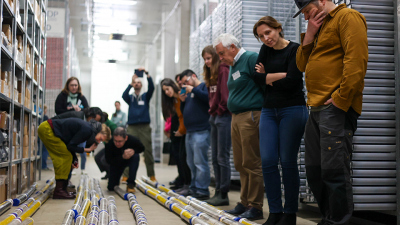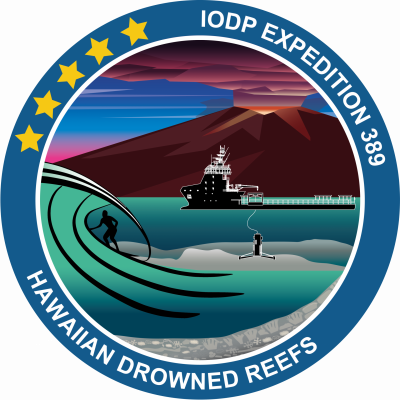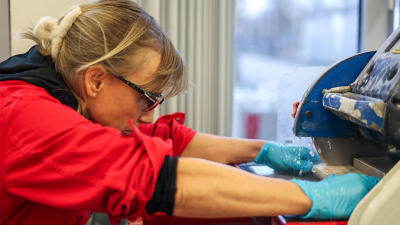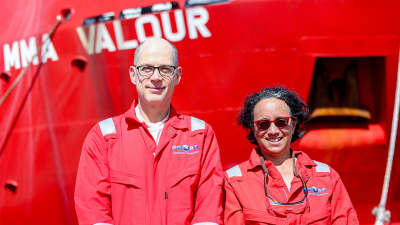- Home
- Discover
- Media Releases
- IODP Exp389 OSP
International research team obtains first high-resolution fossil coral record of environmental data off Hawai’i
The IODP Expedition 389 “Hawaiian Drowned Reefs” aimed to recover a record of past climate and reef conditions off the coast of Hawai’i. During the offshore phase of the expedition a total of 426 meters of cores were recovered from below the seabed at water depths from 130 to 1240 meters. Corals store past environmental conditions in their skeletons. Researchers will use cutting-edge methods in their laboratories to extract information about sea level or climate changes from these tremendously important high-resolution archives. Looking back in Earth’s history will provide valuable insight into the mechanisms that cause climate change, including abrupt events, and into the impact of these changes on reef growth and health.
Prof. Jody Webster: “We were able to recover a spectacular sequence of fossil coral reef deposits that will enable us to decipher in unprecedented detail, how sea level, paleoclimate and the reef ecosystem has changed over the past 500,000 years, particularly during periods of rapid global change.”
The expedition is the culmination of many years of planning to carefully select the best locations to obtain records of past changes to inform and test important climate change theories.
Prof. Christina Ravelo: “We are also delighted to have recovered many samples of annually banded fossil corals that will be used to obtain for the first time, detailed records of monthly changes in oceanographic conditions from past periods that were different than today. The idea is to use this data to inform predictions of future Pacific-wide climate change.”
The scientific objectives of the expedition aim to address questions on four main topics:
- To measure the extent of sea level change over the past half a million years
- To investigate why sea level and climate changes through time
- To investigate how coral reefs respond to abrupt sea level and climate changes, and
- To improve scientific knowledge of the growth and subsidence of Hawai’i over time.
The Science Team of IODP Expedition 389 includes 31 scientists of different disciplines from Australia, Austria, China, Denmark, France, Germany, Great Britain, India, Japan, the Netherlands, Spain and the USA, ten of whom sailed onboard the multipurpose vessel MMA Valour in September and October 2023 off the coast of Hawai’i, to collect the cores and data using a remotely operated coring system. After the offshore phase, the whole Science Team met at the IODP Bremen Core Repository, at MARUM – Center for Marine Environmental Sciences at the University of Bremen, Germany, in February 2024 to split, analyze and sample the cores and begin to interpret the data collected. The scientists will continue to work on samples and data over the next years in their home laboratories in depth to decipher detailed information from this unique new material and associated data.
The cores will be archived and made accessible for further scientific research by the international scientific community. After the one year-moratorium period following the onshore phase of the expedition material and data will become open access. Resulting findings will be published over the next months and years.
The expedition is conducted by the European Consortium for Ocean Research Drilling (ECORD) as part of the International Ocean Discovery Program (IODP). IODP is a publicly-funded international marine research program supported by 21 countries, which explores Earth's history and dynamics recorded in seafloor sediments and rocks, and monitors sub-seafloor environments. Through multiple platforms – a feature unique to IODP – scientists sample the deep biosphere and sub-seafloor ocean, environmental change, processes and effects, and solid Earth cycles and dynamics.
The ECORD Science Operator has extensive experience working in sensitive ecosystems such as coral reefs, following seagoing expeditions to the Great Barrier Reef (Australia, 2010) and Tahiti (2005).
More Information:
- About the expedition
- About the research program
- About the European part of the program and Mission-Specific Platform expeditions
- Frequently Asked Questions
- Expedition Logbook
Contact:
IODP Exp 389 Co-Chief Scientists:
Professor Jody Webster
Geocoastal Research Group, School of Geosciences, University of Sydney, Australia
Email: [Bitte aktivieren Sie Javascript]
Professor Christina Ravelo
Ocean Sciences Department at the University of California, Santa Cruz, USA
Email: [Bitte aktivieren Sie Javascript]
IODP Exp 389 Operations:
Dave McInroy
ECORD Science Operator
British Geological Survey
Email: [Bitte aktivieren Sie Javascript]
Phone: +44 7792 565 801
ECORD Outreach:
Ulrike Prange
ECORD Science Operator – Outreach and Media Relations
MARUM – Center for Marine Environmental Sciences
University of Bremen
Email: [Bitte aktivieren Sie Javascript]
Phone: +49 421 218-65540






